Search Images
Browse Content (p. 872)
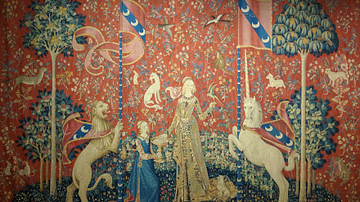
Image
The Lady and the Unicorn: Taste
The Lady and the Unicorn are six tapestries depicting a medieval lady in various poses. Each scene depicts one of the five senses; the sixth scene is labelled À Mon Seul Désir ("to my only desire") whose meaning is unclear. Historians attribute...
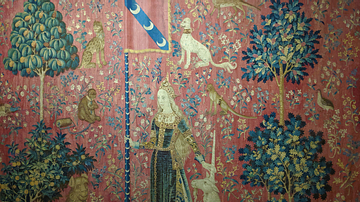
Image
The Lady and the Unicorn: Touch
The Lady and the Unicorn are six tapestries depicting a medieval lady in various poses. Each scene depicts one of the five senses; the sixth scene is labelled À Mon Seul Désir ("to my only desire") whose meaning is unclear. Historians attribute...
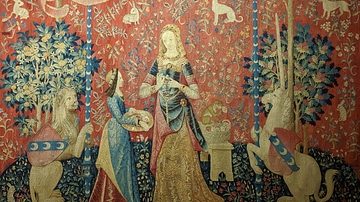
Image
The Lady and the Unicorn: Smell
The Lady and the Unicorn are six tapestries depicting a medieval lady in various poses. Each scene depicts one of the five senses; the sixth scene is labelled À Mon Seul Désir ("to my only desire") whose meaning is unclear. Historians attribute...
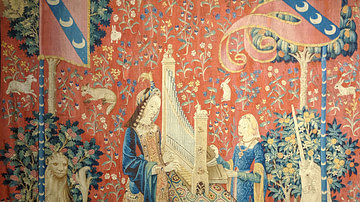
Image
The Lady and the Unicorn: Hearing
The Lady and the Unicorn are six tapestries depicting a medieval lady in various poses. Each scene depicts one of the five senses; the sixth scene is labelled À Mon Seul Désir ("to my only desire") whose meaning is unclear. Historians attribute...
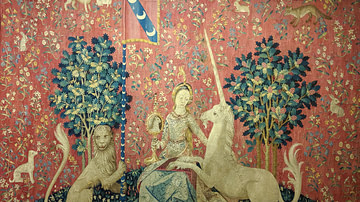
Image
The Lady and the Unicorn: Sight
The Lady and the Unicorn are six tapestries depicting a medieval lady in various poses. Each scene depicts one of the five senses; the sixth scene is labelled À Mon Seul Désir ("to my only desire") whose meaning is unclear. Historians attribute...
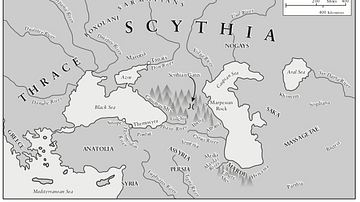
Image
Traditional Scythian-Occupied Region East of Ukraine
A map of the traditional areas inhabited by the Scythians, stretching east from the Ukraine.
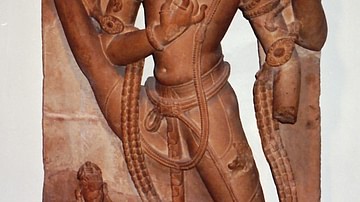
Image
Vishnu in His Dwarf Incarnation
This image was created during the rule of the Gurjara-Pratihara Dynasty (8th century CE - 11th century CE) in ancient India. It is a fine specimen of the sculptural style that flourished in the period. It shows the Hindu god Vishnu in his...
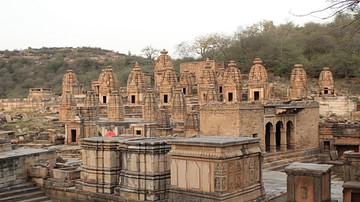
Image
Bateshwar Group of Temples, India
This image shows the Bateshwar group of Hindu temples built during the 8th and 10th centuries CE by the Gurjara-Pratihara dynasty (8th century CE - 11th century CE) of northern India. In total there are about 200 temples spread over an...
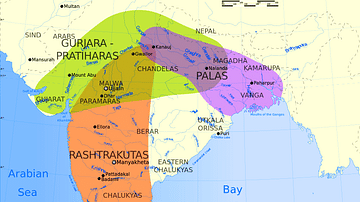
Image
The Rashtrakuta, Gurjara-Pratihara and Pala Empires, Ancient India
This map shows the territorial extent of the Rashtrakuta (8th century CE - 10th century CE), Gurjara-Pratihara or Pratihara (8th century CE - 11th century CE) and Pala (8th century CE - 12th century CE) empires. These three empires flourished...
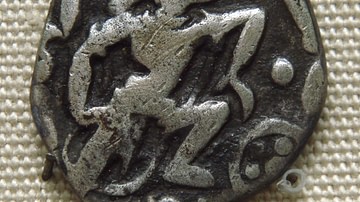
Image
Gurjara-Pratihara Coin
This coin belongs to the Gurjara-Pratihara Dynasty (8th century CE - 11th century CE). It shows an image of the Hindu god Vishnu in his boar (Varaha) incarnation, with a human body and a boar’s head, rescuing the earth. It was issued during...